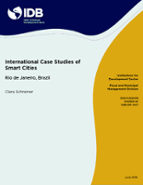International Case Studies of Smart Cities: Rio de Janeiro, Brazil
Date
Jun 2016
This case study is one of ten international studies developed by the Inter-American Development Bank (IDB), in association with the Korean Research Institute for Human Settlements (KRIHS), for the cities of Anyang, Medellin, Namyangju, Orlando, Pangyo, Rio de Janeiro, Santander, Singapore, Songdo, and Tel Aviv. At the IDB, the Competitiveness and Innovation Division (CTI), the Fiscal and Municipal Management Division (FMM), and the Emerging and Sustainable Cities Initiative (ESCI) coordinated the study. This project was part of technical cooperation ME-T1254, financed by the Knowledge Partnership Korean Fund for Technology and Innovation of the Republic of Korea. At KRIHS, the National Infrastructure Research Division coordinated the project and the Global Development Partnership Center provided the funding. The case study includes the experience of the city of Rio de Janeiro in smart city initiatives, focusing mainly on Rio Operations Center Project-COR. The methodology was based on field research, site visits, publications, and interviews held with representatives of local government of the City of Rio de Janeiro. The report addresses the city backdrop, the main urban challenges, the history of digital initiatives, and their evolution over time. For the Rio Operations Center, the general model of participation, organizational aspects, the keys functions, the monitored events, the mechanisms for access, dissemination of information, and the decision-making process are described, as well as the typologies of existing systems and their integration with COR. The study concludes that it is a successful model with a high degree of maturity, and that sharing the experience of Rio de Janeiro with other cities is very important. However, the model needs to continue evolving and rely on strong institutional support so that Rio de Janeiro's population can increasingly enjoy the benefits of technological innovations applied to the city's daily challenges.




